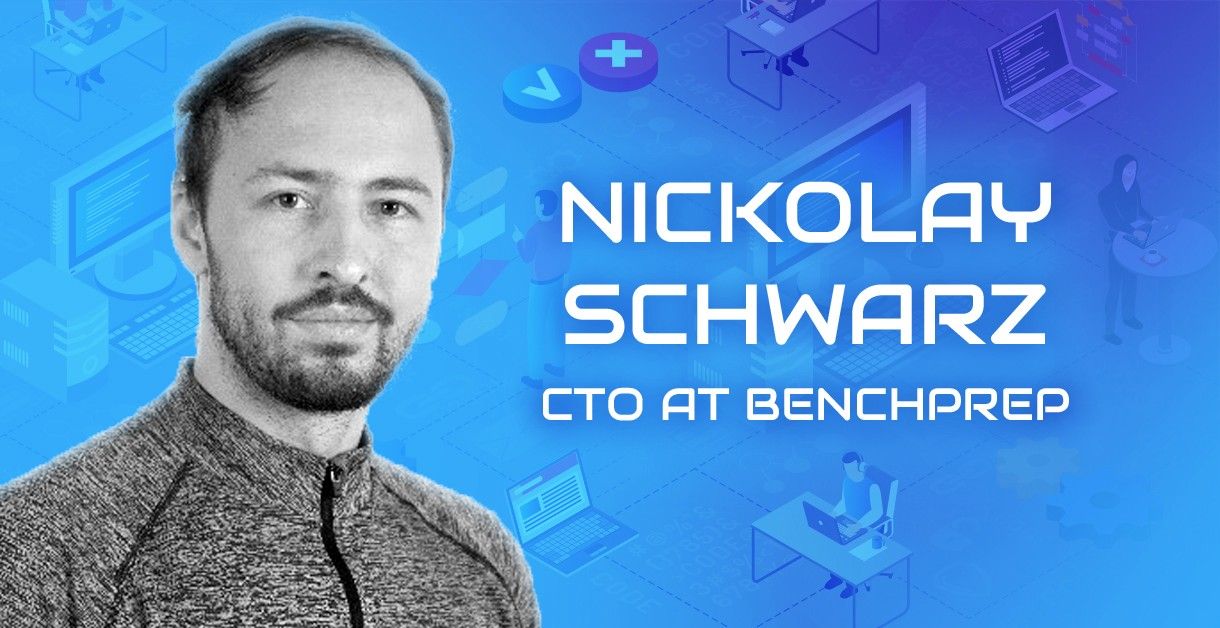 Profitable tech business model – tackling arguably one of the largest challenges tech startups face
Profitable tech business model – tackling arguably one of the largest challenges tech startups face
Nickolay Schwarz is CTO at BenchPrep, an e-learning software platform that provides digital learning solutions to some of the world’s leading education, testing, and training organizations. Nickolay has experience helping a tech startup find its way to a profitable tech business model. He recently participated in a TechDebate in Chicago, Illinois, where the panel discussed the challenges of building a tech startup to scale. Nickolay and I had the opportunity to further discuss some of his thoughts on the topic.
Twenty years ago, the technology industry was in a much different place in that we were solving a lot of brand-new technology problems. Today, many of these core technology problems have been solved. What are some of the largest challenges tech companies face today?
NICKOLAY: Today’s customers, both B2B and B2C, are becoming more educated than ever. They demand good experiences and expect products to drive outcomes that align with their goals. Tech companies must establish a strong cadence of feedback, research, and partnership with customers to nurture a successful culture of innovation and keep a pulse on the market needs. If you do not foster an effective and ongoing understanding of your customers and the market, the market will move on without you.
Of course, it depends on the business of the company, but generally speaking, nurturing a culture of innovation driven by an understanding of your customers is the ultimate challenge. Arguably equally as challenging is constructing a business model that is profitable and effective. As you are building a business, you must ensure you have a product-market fit that can be efficiently scaled and delivered to a large enough customer base to be profitable.
Especially for SaaS where your product must be able to scale without much customer-to-customer customization. You can build a customer–product fit for one customer or a very small group of customers, but if your product cannot serve a large enough customer group without customization, you will likely never be able to scale profitably.
Once you have a product that fulfills a market need, what is the most difficult part of scaling a tech company?
NICKOLAY: Again, just because you have a product-market fit, that does not mean you have figured it out. You still need to determine how to scale the revenue engine, scale the delivery, correctly identify ops, and determine how to scale your ops. Usually, pressing challenges do not lie in infrastructure and technology. The challenges tend to be more in the business model and go-to-market strategy. Maybe you have figured out the technology, but how will you sell it?
After you have figured out the business model and your approach to selling the technology in the market, recruiting needed technology talent is the next significant challenge. Finding the right talent is important and challenging: the right people will make your company, but the wrong people will break it.
BenchPrep seems to have had an interesting journey finding both a product-market fit and developing a profitable business model. What did this journey look like?
NICKOLAY: When I joined BenchPrep more than eight years ago, there was just a handful of us. I was one of the earlier senior tech people, and we were just closing a round of financing that would allow us to take off in the B2C market. Our vision was a test and exam preparation application that would be sold directly to customers. We were successful in that users loved the app, and we achieved high engagement and customer satisfaction scores. However, we could not figure out the economics of the business and how to scale it profitably.
We went through the ups and downs so many startups face to find a successful path. We ultimately determined that finding a profitable B2C business model meant we would have to turn the company away from what we wanted to be in terms of the culture and personality of the business. So we made the decision to pivot.
At that point, the company employed approximately 30 people, and we scaled down to seven. We transitioned to providing a B2B platform, which is now being used by leading education and training organizations across all industries that need to offer highly effective test and certification prep solutions. Once we made the move to sell to a B2B market rather than the B2C market, we took off. We now have more than 100 people in the company, and we are doing well.
Are there scenarios where it makes sense for growing tech companies to use contract workers or consultants? Conversely, are there times when it does not make sense to use contractors?
NICKOLAY: In each situation, each stage of a company’s life will require a different approach to the utilization of contractors and consultants. I do not think it is realistic for most companies to eliminate contractors and consultants, so I think it is best for tech leaders to be flexible and open and attempt to minimize their biases.
There are clear cases where you should use contractors & consultants and clear cases where you really shouldn’t and everything in between. If you have pressing needs that are non-core to your business, this might be an opportunity to use contract workers and consultants. In these scenarios, access to high-level intellectual property is not necessary—basically, you need pure staff augmentation.
Having the right processes in place also allows you to use contract workers and consultants much more effectively. And of course, in reverse, If you have a messy process, adding consultants and contractors is only going to pour gasoline on the situation.
Maybe you do not even have a business yet. If this is the case, using consultants and contractors could be an affordable opportunity to quickly run a lot of different prototypes and see what works.
As an organization grows, how can it maintain its culture and strategically evolve it?
NICKOLAY: I think anybody who is strictly dedicated to the preservation of a multi-characteristic culture might be doing it incorrectly. Ultimately, it comes down to what is important to you. What are the building blocks of your company’s DNA? Are you more focused on selling? Are you dedicated to building the best place to work? Is the organization process oriented? Is there a culture of transparency and openness?
Whatever cultural elements are there, identify them, and be honest with yourself. Ultimately, you have to figure out what is really at the core of your culture, preserve what is most important, and be open to adjusting everything else. Attempting to keep all the characteristics of the organization’s culture steady over time will not work, especially as the company grows.
What is the best advice you can offer CTOs or founders of young and growing tech companies?
NICKOLAY: First, establish trust with your business partners early and be nimble. If you do not establish trust early, you are probably going to fail (especially if you are not one of the founders). You are impacting something people are very committed to. You need to prove yourself and do it fast so your partners trust you to manage and advance what has taken so much of their blood, sweat, and tears to develop.
Second, especially in the early days of a company, nimbleness will allow you to pivot as you need and not be afraid to ask yourself tough questions.
Sphere Software (https://sphereinc.com), is the sponsor and organizer of Techdebates.org and also finds great value in these follow-up discussions with industry experts. Sphere is a technology consulting and solutions company. Everything we do is designed to accelerate your business, remove technical constraints and eliminate staffing bottlenecks.

 Profitable tech business model – tackling arguably one of the largest challenges tech startups face
Profitable tech business model – tackling arguably one of the largest challenges tech startups face



